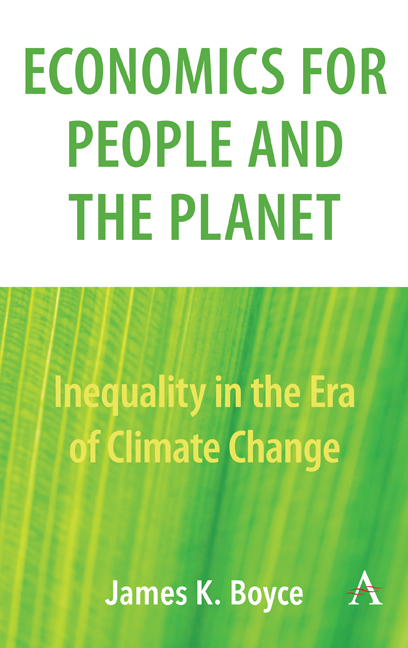Book contents
- Frontmatter
- Contents
- List of Illustrations
- Acknowledgements
- Part I Rethinking Economics and the Environment
- Part II Environmental Injustice
- Chapter 9 Inequality and the Environment
- Chapter 10 Clean Air for All
- Chapter 11 Letter from Flint
- Chapter 12 Let Them Drink Pollution?
- Chapter 13 Letter from Delhi
- Chapter 14 Mapping the Environmental Riskscape
- Chapter 15 Measuring Pollution Inequality
- Chapter 16 Cleaning the Air and Cooling the Planet
- Part III Climate Policy
- Notes
- Publication History
- Index
Chapter 12 - Let Them Drink Pollution?
from Part II - Environmental Injustice
Published online by Cambridge University Press: 12 February 2019
- Frontmatter
- Contents
- List of Illustrations
- Acknowledgements
- Part I Rethinking Economics and the Environment
- Part II Environmental Injustice
- Chapter 9 Inequality and the Environment
- Chapter 10 Clean Air for All
- Chapter 11 Letter from Flint
- Chapter 12 Let Them Drink Pollution?
- Chapter 13 Letter from Delhi
- Chapter 14 Mapping the Environmental Riskscape
- Chapter 15 Measuring Pollution Inequality
- Chapter 16 Cleaning the Air and Cooling the Planet
- Part III Climate Policy
- Notes
- Publication History
- Index
Summary
The lead poisoning crisis in Flint is not just about drinking water. And it's not just about Flint.
The tragedy in Flint, Michigan, where residents have been poisoned by lead contamination, is not just about drinking water. And it's not just about Flint. It's about race and class, and the stark contradiction between the American dream of equal rights and opportunity for all and the American nightmare of metastasizing inequality of wealth and power.
The link between environmental quality and economic inequality was spelled out more than two decades ago in a memorandum signed by Lawrence Summers, then chief economist of the World Bank, excerpts of which appeared in the Economist under the provocative title, ‘Let Them Eat Pollution’. Starting from the premise that the costs of pollution depend on ‘the forgone earnings from increased morbidity and mortality’, Summers concluded that ‘the economic logic of dumping a load of toxic waste in the lowest-wage country is impeccable and we should face up to that’.
A different logic is supposed to underpin US environmental policies. The Federal Water Pollution Control Act mandates that water quality standards should ‘protect the public health’–period. Its aim, as former Environmental Protection Agency (EPA) administrator Douglas Costle put it, is ‘protection of the health of all Americans’. Under the law, clean water is a right, not something to be provided only insofar as justified by the purchasing power of the community in question.
Even when cost-benefit calculations are brought to bear on environmental policy, the EPA uses a single ‘value of a statistical life’–currently around $9 million–for every person in the country, rather than differentiating across individuals on the basis of income or other attributes.
In practice, however, the role of costs and benefits in shaping public policies often depends on power of those to whom they accrue. When those on the receiving end are poor, their interests–and their lives–often count for less, much as the Summers memo recommended. And when they are racial and ethnic minorities, the political process often discounts their well-being even more.
- Type
- Chapter
- Information
- Economics for People and the PlanetInequality in the Era of Climate Change, pp. 57 - 58Publisher: Anthem PressPrint publication year: 2019



